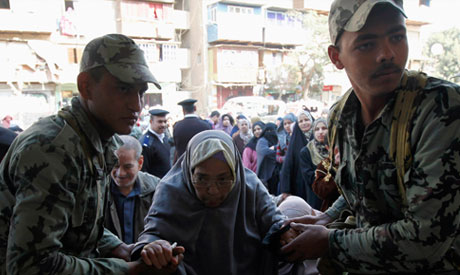 Egypt's opposition leader Mohamed ElBaradei has waded into the debate on the role of the military with a Twitter comment that "the armed forces are a part of the executive authority" and therefore its budget and business interests should be not be separate from the rest of the national budget.
Egypt's opposition leader Mohamed ElBaradei has waded into the debate on the role of the military with a Twitter comment that "the armed forces are a part of the executive authority" and therefore its budget and business interests should be not be separate from the rest of the national budget.
ElBaradei demands transparent military budget
By-Ahram
Home News
00:04
Friday ,06 April 2012

The Nobel laureate and former head of the International Atomic Energy Agency (IAEA), added on Thursday that Egypt should be "one country with one budget." He called for a balance between the branches of government and for all authorities to be monitored.
ElBaradei's statement came in reaction to the ongoing debate on the position of the armed forces in the soon to be drafted constitution and whether Parliament should have the right to monitor its economic activities.
Following the ouster of Hosni Mubarak, who was also the commander-in-chief of the armed forces, a military junta has ruled the country. The economic activities of the military and the secrecy of its budget have come under growing attack from a number of quarters.
In February, political activists organised a campaign to boycott military products under the slogan "Boycott them" to demand the right to monitor the performance of the executive and legislative authorities. The campaign followed the "Lairs" campaign against the junta that started in November 2011 after military police and security forces attacked a sit-in in Tahrir Square on 19 November. Forty died in the ensuing violence.
Last week, a member of the junta said military spending made up just 5 percent of the government's budget, less than half the proportion in other countries, with the military covering the rest of the expenditure through its businesses.
Major General Mahmoud Nasr, assistant minister of defence for financial affairs, said government funding of the military was the minimum required to cover wages, supplies and equipment maintenance.
Nasr defended the military's wide-ranging economic activities, saying they not only made it financially self-sufficient but allowed it to maintain a six-month strategic stock of basic commodities in case of a crisis.
The businesses also enable the military to assist the government when needed, he added. In 2011, the military boosted Egypt's tumbling foreign reserves with $1 billion from its own reserves.
Nasr added that the national Service Authority, one of the military's production arms, ran a LE6.3 billion economic "operations" in 2011, up from just LE11 million in 1979. The net profit of the authority was LE7.7 billion between 1990 and 2011.
The size and the profits of the military's other economic activities remain unknown.
Given the scale and long-term goals of the military's business projects, Nasr said, it was unacceptable for the military to hand them over to the government.
The economic activity of the military also serves civilians, he explained, adding that they generate tax revenue and are supervised by the Central Auditing Agency.
"The armed forces will fight to defend its projects. We have been building them for 30 years and we won't give them to anyone else to destroy," said Nasr.


